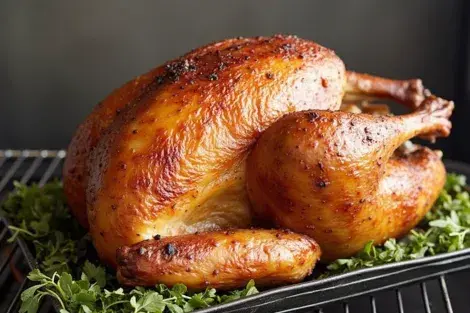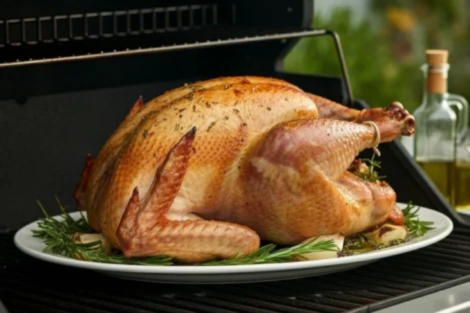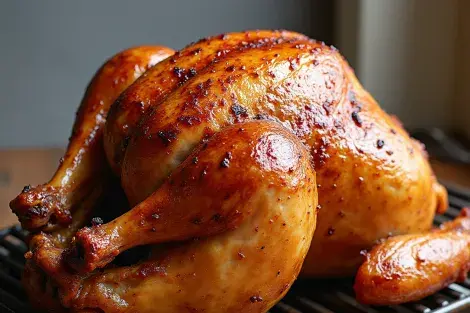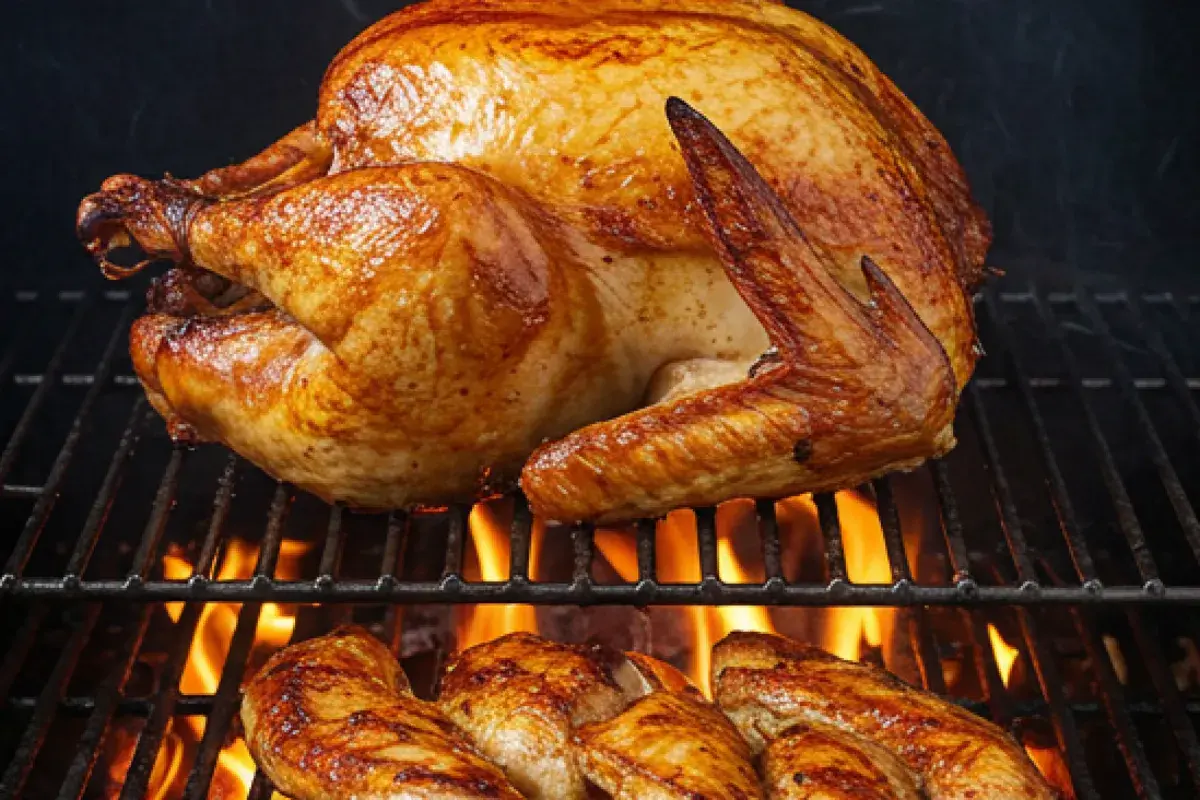When it comes to preparing a show-stopping roast turkey, grilling is an exceptional choice that brings out unique flavors and adds a deliciously smoky aroma. By grilling instead of roasting in the oven, you can create a juicy, tender roast turkey with a crispy skin that makes any holiday meal unforgettable. In this guide, we’ll go over every detail, from prepping the turkey to achieving the perfect grill temperature, ensuring your roast turkey is a crowd-pleaser.
Table of Contents
Why Grill Your Turkey?

Grilling a turkey gives you the opportunity to infuse it with rich, smoky flavors while keeping the meat tender and juicy. Plus, it frees up valuable oven space for other dishes, making it a great option for large gatherings. With the right preparation and a few grilling secrets, your roast turkey will stand out as the star of the table.
Ingredients:
- 1 whole turkey (12-14 lbs)
- ½ cup olive oil or melted butter
- Salt and black pepper, to taste
- Fresh herbs (rosemary, thyme, and sage)
- 2 lemons, quartered
- 2 onions, quartered
- 3-4 cloves garlic, smashed
- Optional seasonings: smoked paprika, garlic powder, and cayenne for an extra kick
Step 1: Prepare the Turkey
- Thaw the Turkey Properly: Ensure the turkey is fully thawed. For a frozen turkey, this may take 3-4 days in the refrigerator.
- Remove the Giblets: Take out any giblets or neck pieces from the turkey’s cavity. You need to wash the turkey well and dry it with a paper towel.
Step 2: Season and Stuff the roast Turkey
- Rub with Oil or Butter: Coat the roast turkey with olive oil or melted butter. This stage adds flavor to the taste and helps create a crispy crust with a beautiful golden color.
- Season Generously: Season with salt, black pepper, and your choice of herbs, rubbing the seasoning both on the skin and under it for maximum flavor.
- Stuff the Cavity: Place lemon wedges, onion quarters, garlic cloves, and fresh herbs inside the turkey’s cavity. These aromatics infuse the meat with subtle flavors as it grills.
Step 3: Preheat and Prep the Grill
- Set Up for Indirect Heat: To prevent burning, use indirect heat by lighting one side of the grill while leaving the other side unlit. Set the grill temperature to about 350°F.
- Add Wood Chips (Optional): For added smokiness, toss a handful of soaked wood chips (like applewood or hickory) onto the coals or into a smoker box.
Step 4: Grill the Turkey
- Place Turkey on the Grill: Set the roast turkey on the unlit side of the grill, breast side up. Close the grill lid to maintain a steady temperature.
- Monitor the Temperature: Check every 30 minutes, making sure the grill maintains a steady temperature of 325-350°F. Fill the wood chips or charcoal as needed.
- Baste Occasionally: Baste the roast turkey with more oil or melted butter every 45 minutes to keep it moist and encourage browning.
Step 5: Check for Doneness
- Use a Meat Thermometer: Grill the roast turkey until it reaches an internal temperature of 165°F in the thickest part of the breast and 175°F in the thigh.
- Rest the Turkey: Once done, let the roast turkey rest for at least 20 minutes before carving. This helps retain juices, making the meat tender and flavorful.
Grilling Tips and Secrets for Perfect Roast Turkey:
- Use a Drip Pan: Place a drip pan under the roast turkey to catch drippings, which you can use to make gravy. This also helps reduce flare-ups.
- Foil Shielding for the Breast: If the breast cooks faster than the rest of the bird, cover it with foil to prevent it from drying out.
- Rotate the Turkey: Rotate the roast turkey occasionally to ensure even cooking, especially if your grill has hot spots.
- Try a Spice Rub: For extra flavor, create a spice rub with smoked paprika, garlic powder, and cayenne pepper. Rub it under the skin for a bolder taste.
Side Dish Pairings:
Grilled roast turkey pairs beautifully with classic side dishes. Consider serving with:
- Roasted Root Vegetables: The earthy flavors of carrots, sweet potatoes, and parsnips complement the turkey’s smokiness.
- Stuffing or Dressing: Traditional stuffing is always a great choice, especially when seasoned with herbs that mirror those used in the roast turkey.
- Cranberry sauce: This sauce adds a wonderful, tangy, and delicious flavor that harmonizes with the turkey’s taste.
- Mashed Potatoes and Gravy: Use the roast turkey drippings to make a savory gravy that completes the meal.
1. Selecting the Right Turkey for Grilling
When choosing a turkey for grilling, opt for a smaller bird (between 10-14 pounds), as larger turkeys can be challenging to cook evenly on a grill. Smaller turkeys cook more quickly, allowing you to achieve a perfectly juicy and flavorful result without overcooking the outer layers.
2. Using Brine for Extra Juiciness
Brining the roast turkey before grilling can significantly enhance moisture retention and flavor. A simple brine of salt, sugar, and water with herbs and spices, if desired, will help keep the meat juicy and infuse it with subtle flavors. Brine for 12-24 hours, then pat dry before seasoning and grilling.
3. Preparing the Turkey for Even Cooking
Tucking the wings and tying the legs of the turkey with kitchen twine promotes even cooking and keeps the bird compact, which helps it cook more consistently on the grill. This simple preparation step ensures a uniformly cooked and visually appealing roast turkey .
4. You must choose good pieces of wood for smoking
The choice of wood chips affects the turkey’s flavor. For a mild, sweet smokiness, use applewood or cherry wood chips. Hickory and mesquite, while stronger, add a robust smoky flavor that pairs well with grilled meats. Soak the chips in water for 30 minutes to prevent them from burning too quickly.
5. The Role of Indirect Heat in Grilling
Using indirect heat is essential for grilling a large turkey. It mimics the indirect heat of an oven, ensuring that the bird cooks slowly and evenly without burning. Position the turkey away from direct flames and monitor the grill temperature to maintain a steady 325-350°F.
6. Adding Flavored Butter Under the Skin
For extra flavor and moisture, slide flavored butter or herb butter under the skin before grilling. Butter with garlic, sage, thyme, and lemon zest adds richness and infuses the turkey meat with aromatic flavors that intensify as it grills.
7. Basting Tips for Crispy Skin
While basting helps keep the turkey moist, avoid over-basting, as too much moisture can prevent the skin from crisping. Basting every 45 minutes with melted butter or oil is sufficient to keep the skin golden and crisp without making it soggy.
8. Monitoring Grill Temperature Closely
Maintaining a consistent temperature is key to grilling a turkey successfully. If the grill temperature fluctuates too much, the turkey may cook unevenly. Use a grill thermometer to keep track and adjust as needed, adding more charcoal or adjusting gas burners to keep the temperature steady.
9. Adding a Flavorful Marinade for Depth
Marinating the turkey before grilling can enhance its flavor, especially if you enjoy bold tastes. A marinade with lemon juice, garlic, olive oil, and fresh herbs adds brightness, while a marinade with soy sauce, honey, and spices can add a slightly sweet and savory glaze.
10. Checking Internal Temperature in Multiple Spots
When checking for doneness, measure the internal temperature in both the breast and thigh to ensure the whole bird is fully cooked. Insert the thermometer in the thickest parts, ensuring it reaches 165°F in the breast and 175°F in the thigh.
11. Resting the Turkey After Grilling
Letting the roast turkey rest for at least 20 minutes after grilling allows the juices to redistribute throughout the meat, resulting in a tender and juicy turkey. Cover loosely with foil to keep it warm, but avoid tightly covering, as it may cause the skin to lose its crispness.
12. Using a Meat Injector for Extra Juiciness
For an extra layer of moisture and flavor, use a meat injector to infuse the turkey with seasoned broth or melted butter. Injecting the liquid directly into the breast and thighs adds juiciness, particularly for leaner cuts like turkey breast.
13. Enhancing Flavor with a Dry Rub
Applying a dry rub of spices and herbs can add bold flavor to the roast turkey . Paprika, garlic powder, brown sugar, and dried herbs work well for a savory, slightly sweet crust. Rub the seasoning onto the skin and under it for maximum effect.
14. Making Gravy with Smoky Turkey Drippings
Save the flavorful drippings collected in the drip pan to make a rich, smoky gravy. Combine the drippings with flour and turkey or chicken stock to create a gravy that pairs perfectly with the grilled turkey’s flavor.
15. Rotating the Turkey for Even Browning
Rotate the turkey every hour to ensure it browns evenly on all sides, especially if your grill has hot spots. Turning the turkey regularly helps avoid overcooking one side and ensures a uniformly crispy, golden-brown skin.
16. Grilling in Different Weather Conditions
Close the grill cover as tightly as possible to preserve the heat, especially if the weather is cold. Cold air can lower the grill temperature, requiring more charcoal or fuel. In warm weather, open the lid occasionally to avoid overheating and keep the grill temperature in the optimal range.
17. Using a Drip Pan with Aromatics
To add extra flavor to the roast turkey as it grills, fill the drip pan with water and aromatics like lemon slices, rosemary, and garlic. As the liquid evaporates, it infuses the roast turkey with subtle, fragrant notes, enhancing the overall aroma and taste.

18. Carving Techniques for Presentation
For a beautiful presentation, carve the roast turkey in a way that showcases its crispy skin and juicy meat. Separate the breast, thighs, and drumsticks, and slice them thinly, arranging on a platter for easy serving and an elegant display.
19. Experimenting with Global Flavors
You can add an international twist to your grilled roast turkey by incorporating spices from different cuisines. For a Mediterranean flavor, use oregano, sumac, and lemon zest. For a Middle Eastern spin, try cumin, coriander, and za’atar for a unique twist on the classic turkey.
20. Perfect for Outdoor Feasts and Gatherings
Grilled roast turkey is ideal for outdoor feasts and family gatherings, where the grill can serve as both a cooking appliance and a centerpiece. Its smoky aroma and golden, crispy skin make it a memorable addition to any special occasion, adding both flavor and atmosphere.
Conclusion:

Grilling a turkey offers a deliciously smoky twist on traditional roast turkey, with crispy skin and juicy, flavorful meat that’s perfect for any holiday or special occasion. By following these grilling secrets, you’ll have a show-stopping roast turkey that not only looks impressive but tastes incredible. Enjoy your perfectly grilled roast turkey alongside your favorite sides, and make it a centerpiece your guests will remember!

